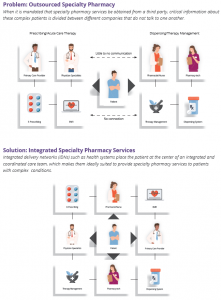The explosion of Specialty Pharmacies within the health system space over the past several years has been well documented. As health systems assume more of the risk for outcomes and total cost of care, they have developed a proactive, integrated, and coordinated approach to address the needs of complex patients within specific disease states. At the center of this integrated model are networks that have created data resources at scale to provide valuable insights into the patient’s journey.
Pharmaceutical companies traditionally work directly with large Specialty Pharmacies to purchase dispensing data that assists them in identifying sales and marketing trends as well as tracking patient access and performance. In contrast, Shields and our nationwide network of over 70 health systems, can report data from a comprehensive single, standardized source that simplifies analytics, lowers costs, and increases the utility of complex patient information. Because of the integration between providers and health systems and Shields’ ability to capture and report on many types of datasets (e.g, Dispensing, Electronic Medical Record (EMR) data, etc.), our pharmaceutical partners can better understand variables such as previous therapies, lab results, abandonment rates, and patient assessments as part of the overall patient journey. The result is that pharmaceutical manufacturers are afforded the opportunity to gain valuable insights across the patient journey which was not previously or widely available.
Ultimately, this integrated model creates an intersection where health systems, payers, and manufacturers can access the integrated insights and programs they need to improve outcomes and reduce the cost of complex pharmacy patient care.
As new value-based health care payment models emerge, shifting from volume-based models, hospitals and health systems are recognizing that the quality-of-care coordination throughout a patients’ complex treatment affects both the well-being of the patient and their own financial viability – making health systems the best source for patient data and real-world evidence.







